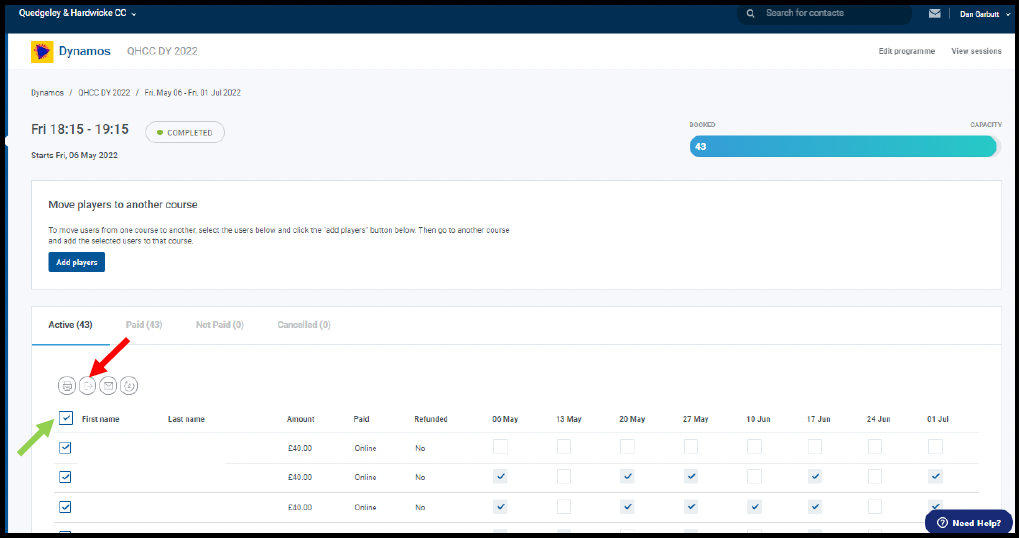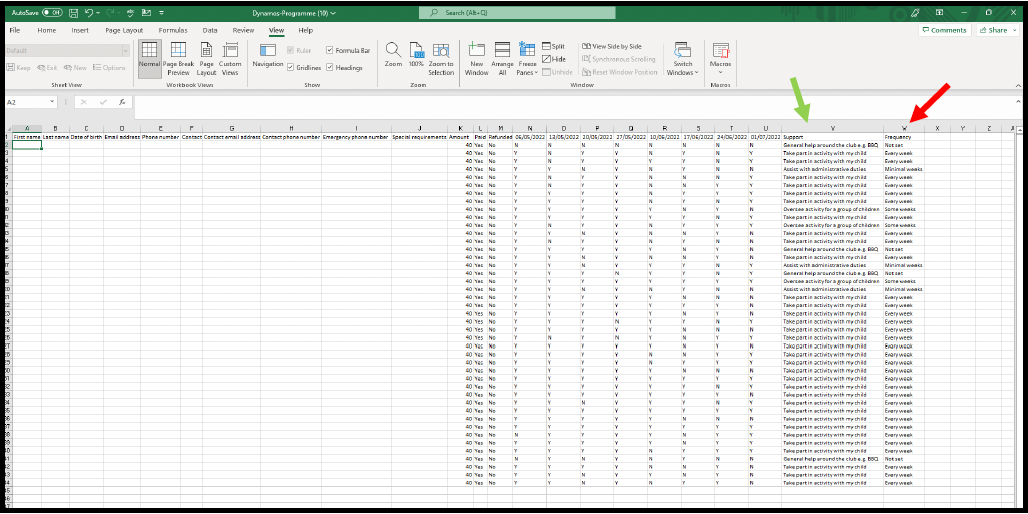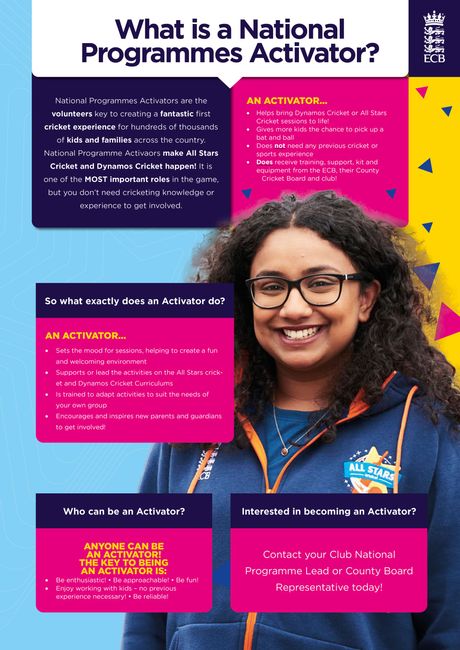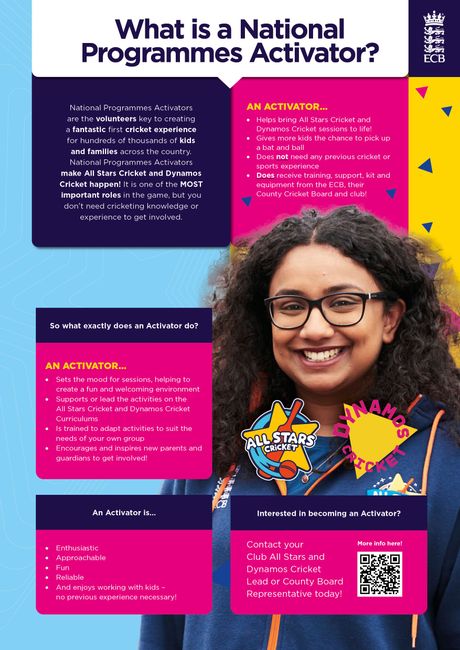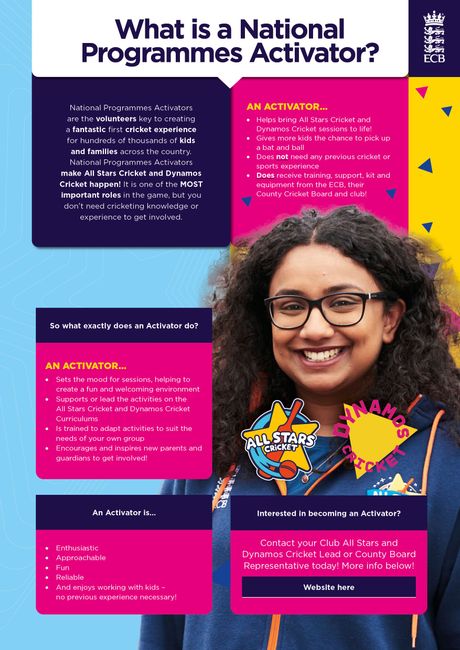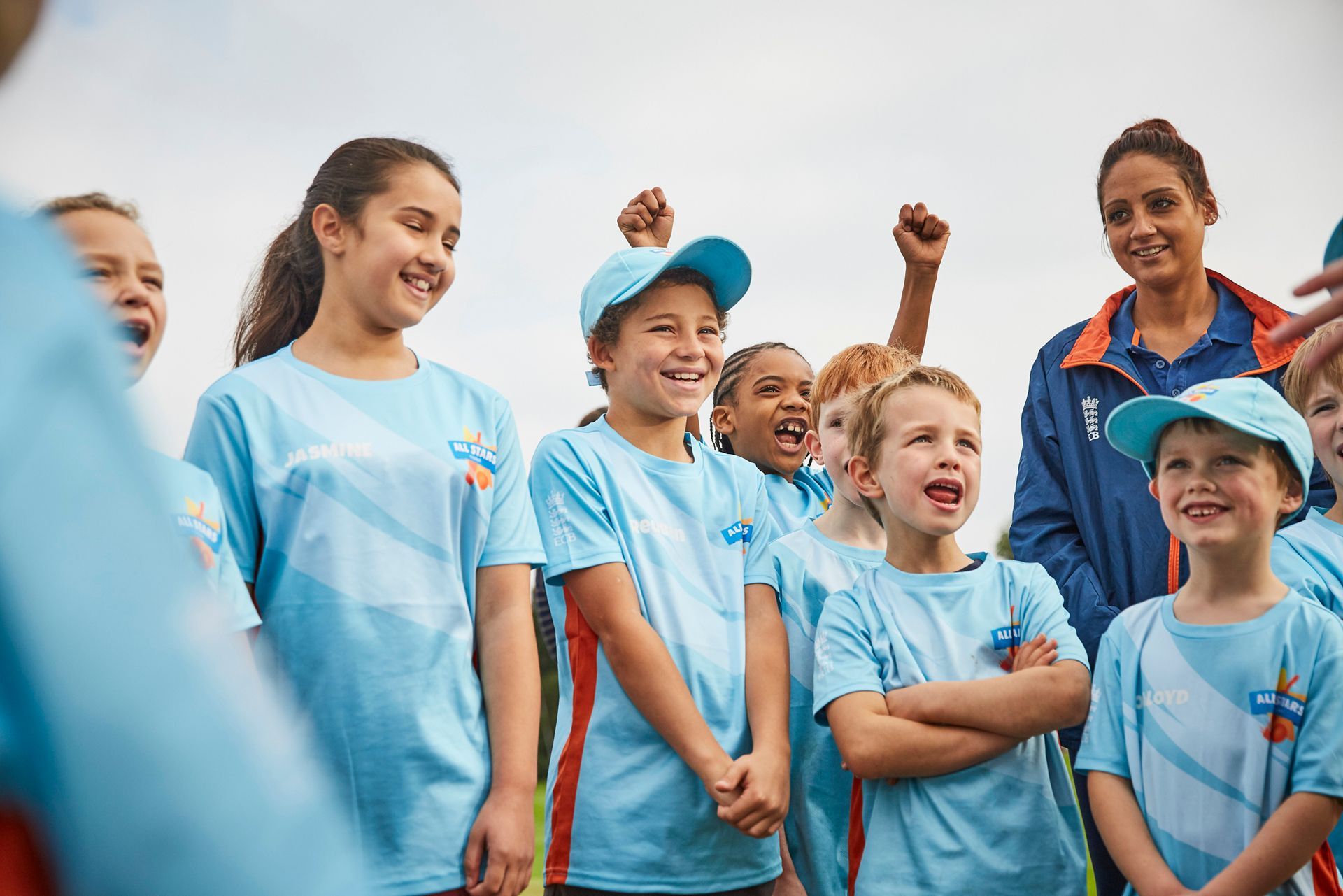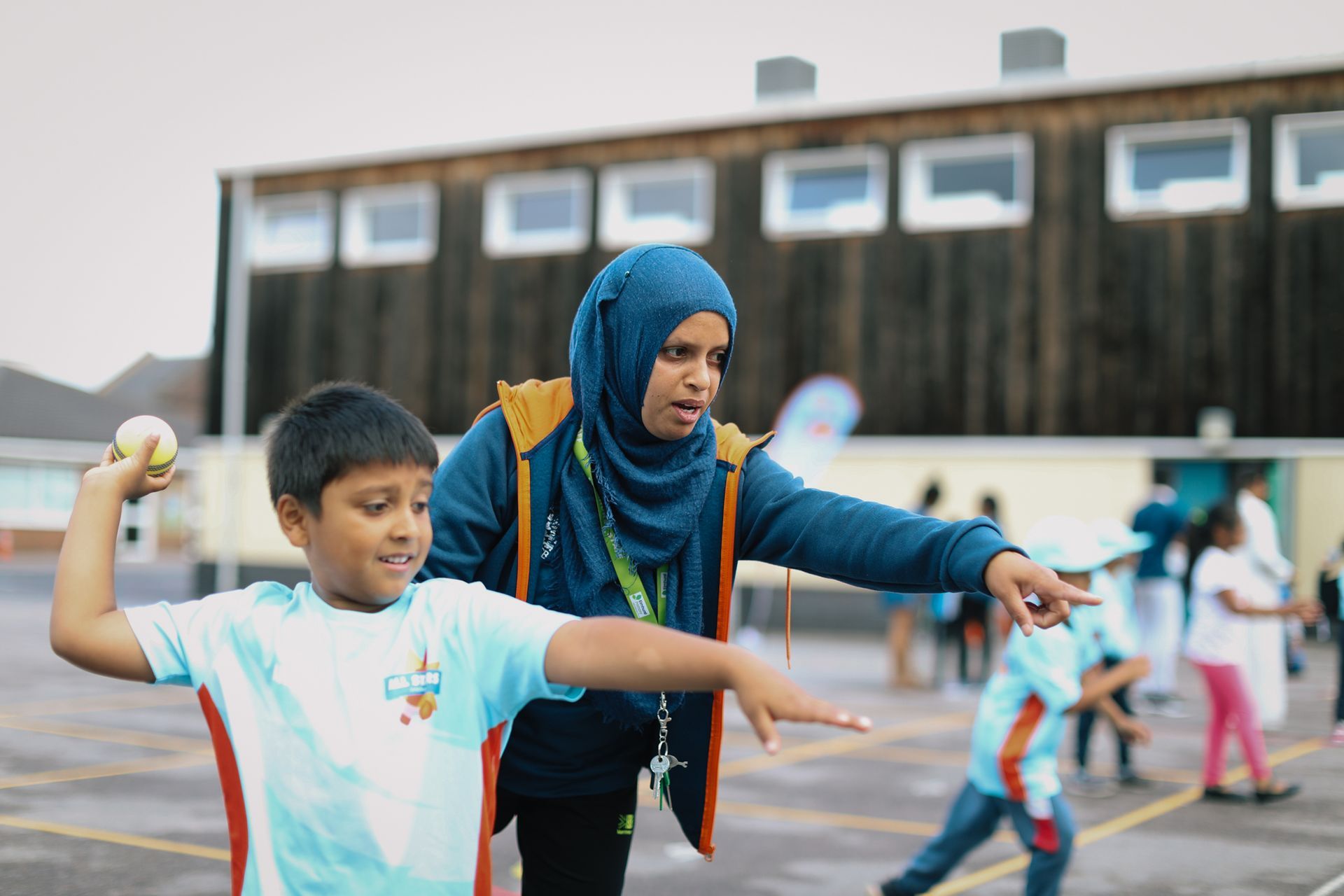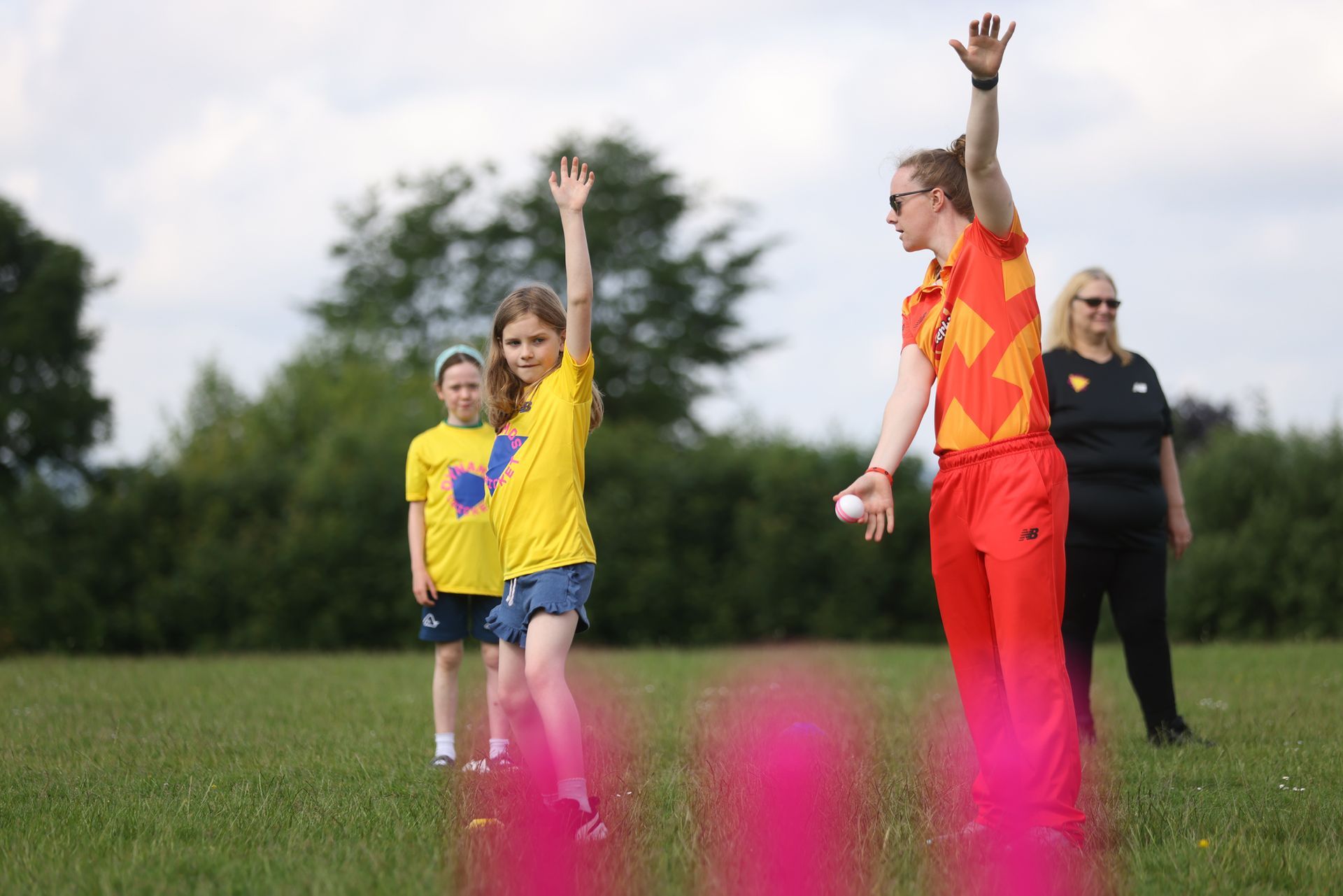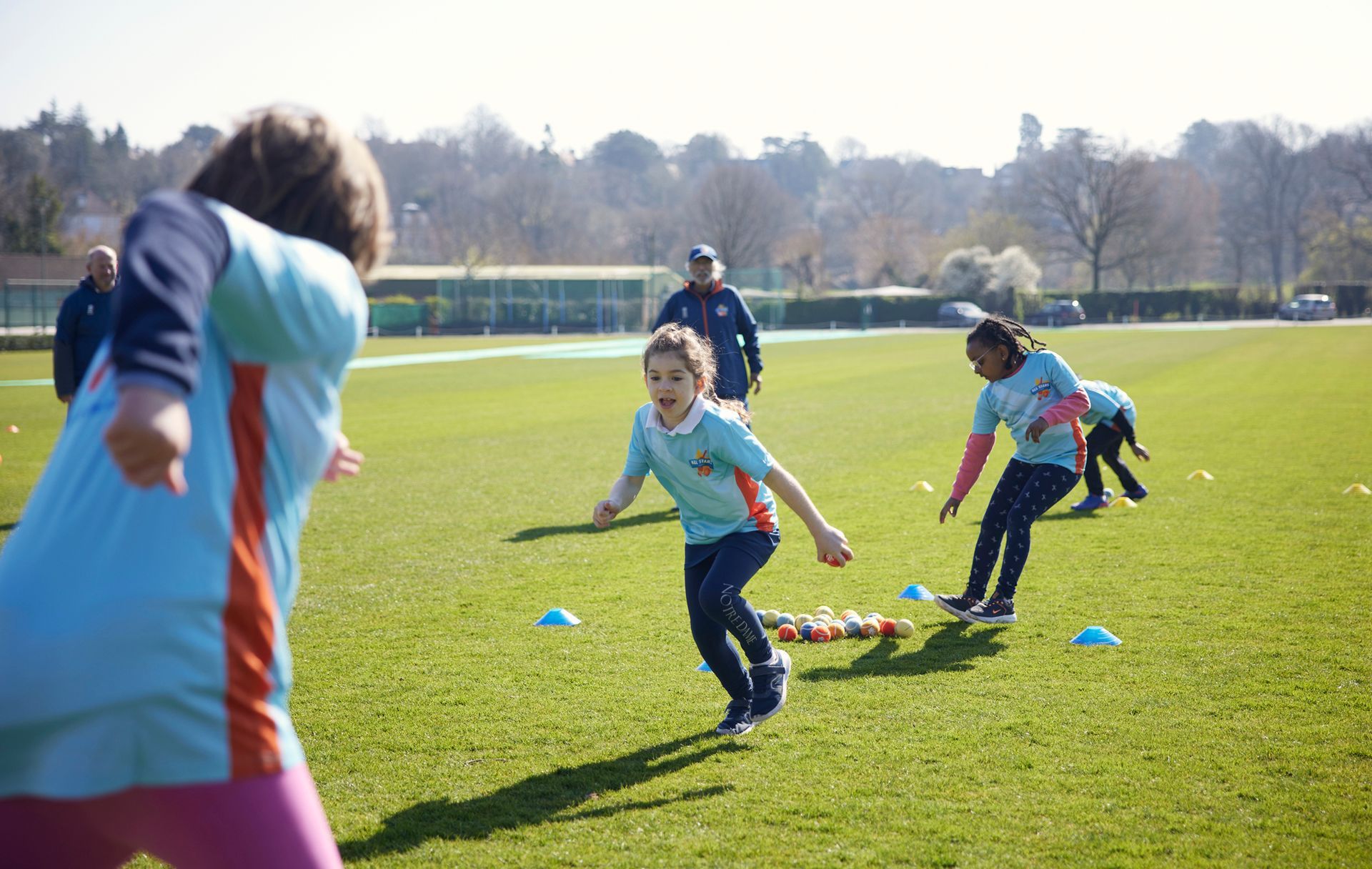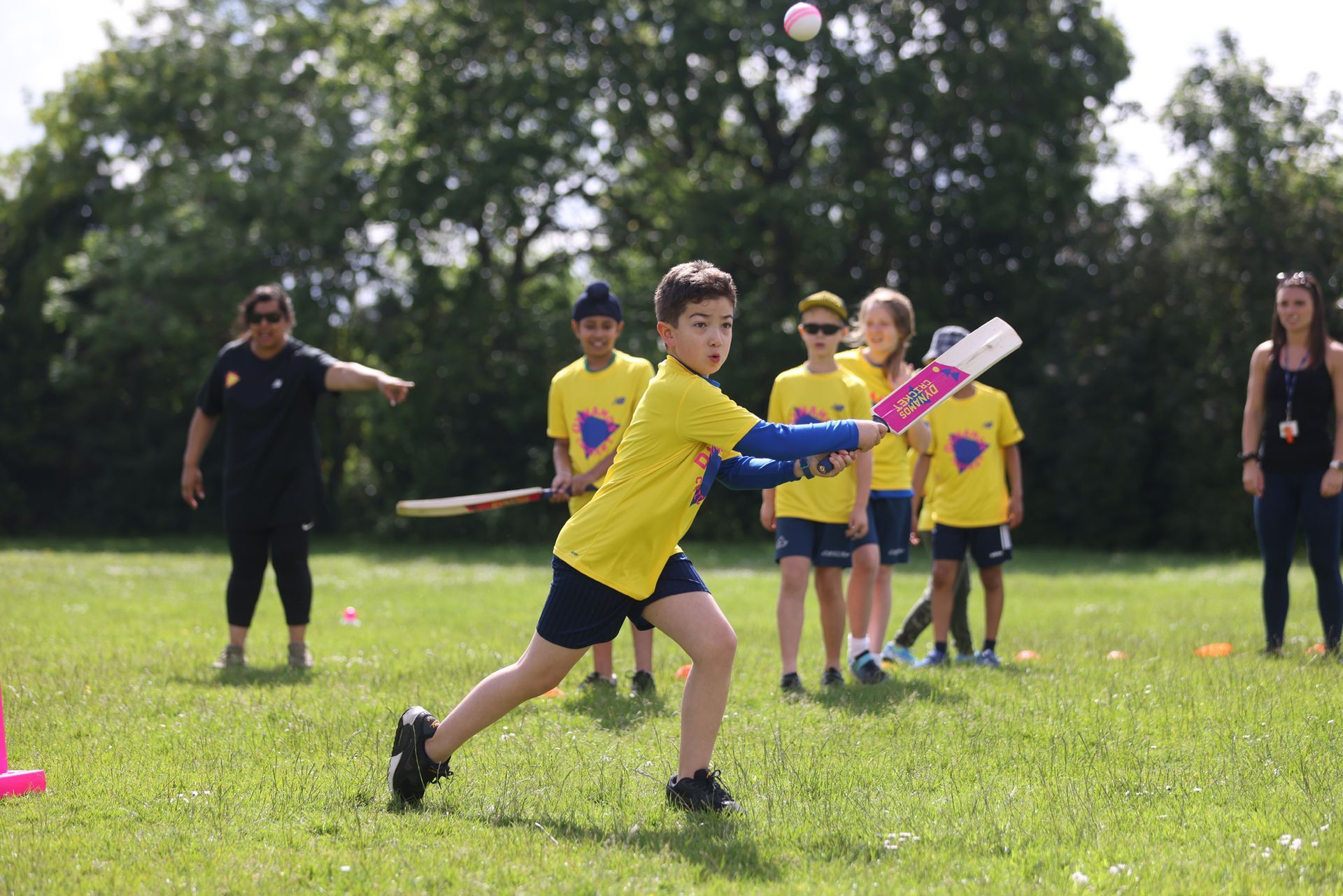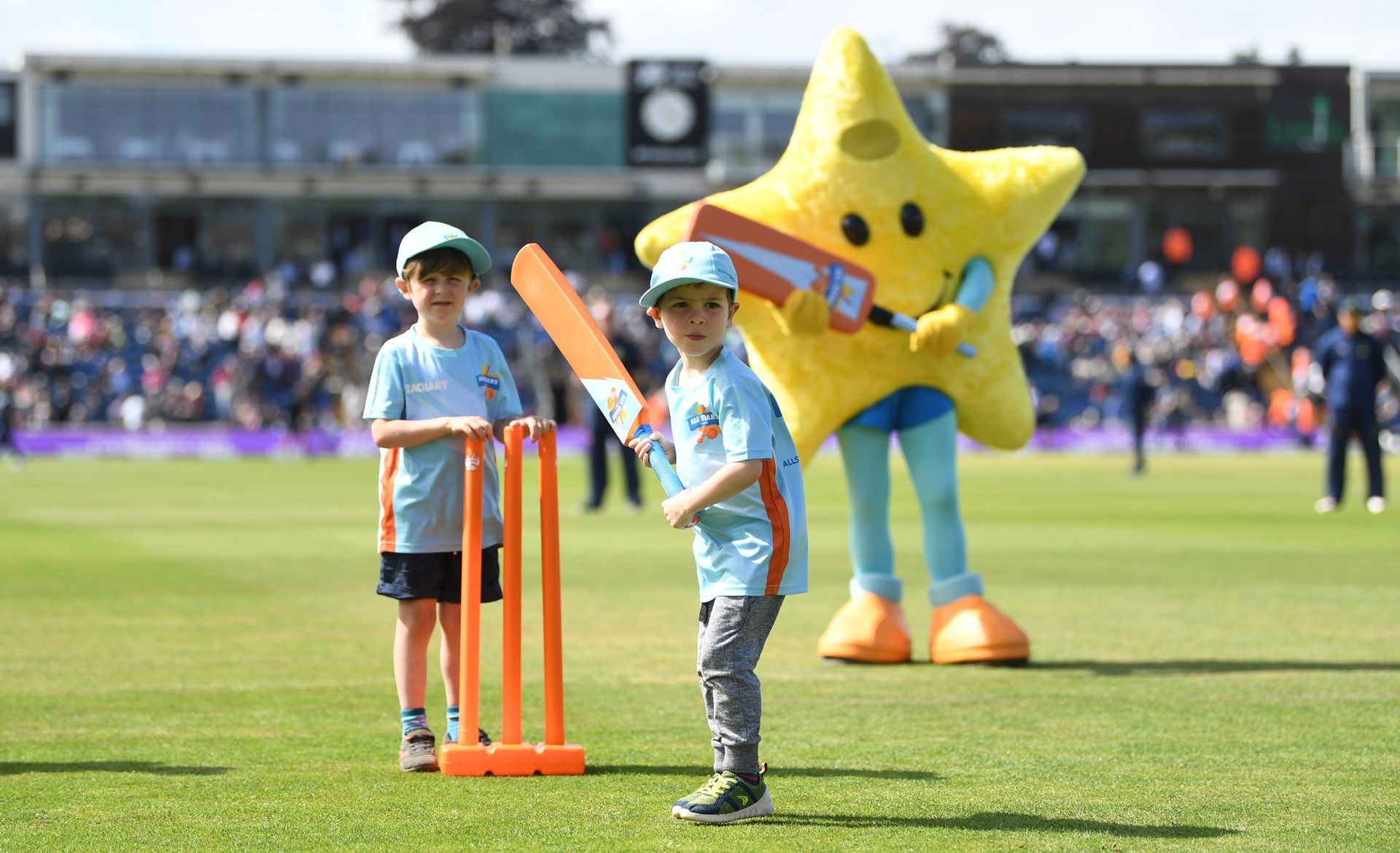Activator Recruitment Toolkit
The ECB will be encouraging parents and guardians who have signed their children up to All Stars or Dynamos to get in touch with their clubs and offer their support as volunteers. This creates a fantastic opportunity for clubs to recruit new Activators and parent helpers for the upcoming season.
Here you can find advice and guidance on how to maximise this opportunity and recruit more volunteers to support your club’s activities
Benefits of Recruitment
Engaging more Activators in your National Programme delivery brings a lot of benefits, including:
1. Making your sessions even more effective by having more people supporting the delivery
2. Improving your volunteer experience as workload and responsibilities are shared out
3. Being able to expand and grow your All Stars and Dynamos offering
4.
Finding engaged volunteers for other areas of your club’s activity
These prospective volunteers may also want to get involved in other areas of the club too. To make the most of this opportunity, it can be helpful if clubs have considered in advance how many volunteers they need and where they would be most useful.
One way of knowing where you could most use additional volunteer support is by mapping which volunteer roles you have, which you need, and who fills these roles. The ECB has created a template to help you do this, which you can find here:
What is an Activator: Recruitment Poster
Check out our new flyer below or download it from the link provided
10 Ways to Recruit More Activators:
1. Regularly check ClubSpark for interested people
Parents and guardians can express their interest in helping at National Programme sessions when they register their kids. This information gets logged and stored on Club Spark. Regularly check Club Spark for interested people and proactively follow up with them either by email or in person.
Guidance on how to use Club Spark and where expressions of interest are logged can be found
here.
2. Talk to people directly
A survey of parents about National Programmes in 2022 found that although many already helped at their club, 15% stated they would be keen to train as an activator but were not aware they could do so. With over 100, 000 All Stars and Dynamos last year this is a large potential group of volunteers that we could be engaging in your programmes. It may sound simple, but nothing has a bigger impact than asking people directly for their help.
It can be tricky running a session and also talking to parents, so consider whether there’s someone who could be responsible for approaching other parents and guardians and encouraging their participation. Try to find someone who is happy to approach new people, to answer any questions, and to share their own experiences as an Activator. This personal conversation can be less intimidating and give a positive 'if they can do it so can I' approach.
3. Make the sign-up process clear, transparent and easy
Parents and guardians can express their interest in helping at National Programme sessions when they first register their kids. However, some might want to get involved later in the Programme once they see how it works.
Make sure it is clear at every stage how helpers can get involved. The process should be as simple as possible and well-publicised. Why not try putting a whiteboard up at sessions for people to register their interest? Or set up a WhatsApp group for people to confirm their availability each week?
4. Start small
People may be nervous to get involved because they don’t know what they’re signing up to. How much time will it take? How often will they be needed? What will they do when they get there?
Encourage more hesitant parents and guardians to smart small; they could help set up the banners before a session or collect balls after an activity. Show them through your communications that you don’t have to be a cricket expert to get involved. As their confidence grows, so too will their commitment.
5. Use Week 0 to inspire and attract
Ahead of the new season, why not hold a Week 0 event to give parents and guardians a taster of National Programmes? These sessions are a brilliant way to gently introduce parents and guardians to the Activator role as well as start building a sense of community and friendship. This will improve the participants’ experience and encourage greater commitment among your volunteers.
6. Emphasise the positives!
One of the best things about helping out at National Programmes is the time it gives people to spend with their kids. Be sure to emphasise this when you communicate with parents and guardians! Actively invite parents to get involved at the end of sessions and teach them simple games and exercises that they can play with their children at home. This can be a powerful first step towards getting more volunteer sign ups.
7. Approach community groups
Pairing up with youth groups – Brownies, Scouts, Primary Schools – is a great way to connect with parents and encourage their involvement in National Programmes. Encourage new families to attend a taster session or social event so they feel welcomed into the club and want to stay involved.
8. Tap into people’s competitive side!
Why not turn Activator recruitment into a game? Encourage existing Activators and helpers to bring along friends and family by rewarding the people who recruit the most volunteers throughout the season. This is a fun way to get Activators invested in the long-term sustainability of the club and its National Programmes.
9. Identify your keenest helpers throughout the year and signpost to training
After watching the success of a National Programme, many parents and guardians will be eager to get involved next season and as a club you will get a feel of who has been most involved over the year. Some County Boards will be running additional training in the summer but if not, getting these keen people added as an activator in Club Spark will be the first step to engaging them more going forward. They can work on completing the eLearning at any time of year and will be more engaged to undertake the face-to-face and virtual training when it’s available locally.
10. Thank everyone!
Saying thank you may seem simple, but it can be hugely powerful. Thanking people not only helps keep your existing volunteers happy and feeling valued, but it can also attract new volunteers who will see that their time and contribution will be appreciated. You might say thank you in person, in a letter, on social media, or through an awards event. Get creative!
Getting More Women Involved
The presence and profile of Women and Girls within Cricket is growing, with National Programmes being one reason for this, and we all have a part to play to keep this momentum going and ensure women and girls can participate across the game. If we want to get more girls playing cricket, it is important for them to have role models. What better way than having women leading and supporting National Programmes? Recruiting more women as Activators not only inspires the next generation, but also enables clubs to grow their activities and National Programme offerings.
1. Inclusive spaces and facilities
The facilities available – or lack of – clearly show how committed a club is to welcoming women. Providing women’s toilets and changing rooms demonstrates that your club is expecting women and girls to attend and get involved. Make sure they are clean, fit for use, and clearly signposted. It can make a huge difference to promote the inclusive services you offer, whether that’s free period products in the toilets, baby-changing facilities, or prayer spaces.
2. Visible role models
Having visible role models helps to inspire the next generation of players and volunteers. Increasing the visibility of women and girls shows people that cricket is a sport for them. Aim to have women and girls equally represented in your social media posts, your newsletters, your clubhouse display board, and on your pitches. Having diverse representation will help engage a broader group of women, so try to include people of different ages, ethnicities, and (dis)ability
3. Engage women already connected to your club
With a rise in women’s teams within clubs, as well as more girls than ever coming into the game through national Programmes and Junior Club Cricket, clubs have a fantastic opportunity to engage women already supporting delivery in areas outside National Programmes. Speaking directly to Mums, Aunties or older sisters of your participants about opportunities to support sessions as Activators is a great start and many clubs have had great success reaching out to their women’s softball and hardball teams to develop an Activator group.
4. Mentoring
Pair new volunteers with a more experienced Activator or helper who can provide feedback, advice, and be a friendly face around the club! Entering a new environment can be a daunting experience so a buddy/ mentor scheme could help all new volunteers, but especially women who may not have had the same opportunities to get involved in sports clubs in the past compared to men.
5. Childcare Opportunities
Parents and guardians may not be able to volunteer at a National Programme because they have other kids they need to look after. Providing childcare support can therefore benefit all parents and guardians. Consider running an informal session alongside your National Programme that other kids can join. This may take one or two volunteers, but will free up plenty of other parents!
6. Provide advanced information
Advanced information about what is expected of volunteers is vital to reassure first-timers that they will be welcome. Be clear about what you are asking from the start. Spelling out the time commitment and expectations can help ease any anxieties or concerns volunteers may have. For example, specify where people arrive, whether they have to register in advance, if there is any preparation needed, if people need to stay after the session, what sort of clothes and footwear they should wear, what happens if it rains etc.
Club Comms to
Parent Volunteers
As parents sign up to the programme you will have an opportunity to welcome parents and guardians to your club or centre and we would always encourage contacting them with key information about sessions. This could cover information about your venue, key contacts of activators and the club safeguarding officer, as well as what will happen in bad weather etc, but it’s also an opportunity to lay the foundations for developing parents and carers as volunteers.
By setting expectations around parents being involved in sessions alongside their All Stars, or umpiring or scoring games for Dynamos, you can begin to break down the barriers or preconceptions that might be in the way of grown ups getting involved. For returning participant parents and carers, the messaging can be adjusted slightly to encourage engagement in training to become Activators. See below suggested template Emails for how you might go about contacting parents and guardians about your sessions and volunteering opportunities.
Emails can be sent through the clubspark system by selecting the individual or the full group of participants from the programme and then selecting the “Email Attendees”. (See screenshots of process and resulting email)
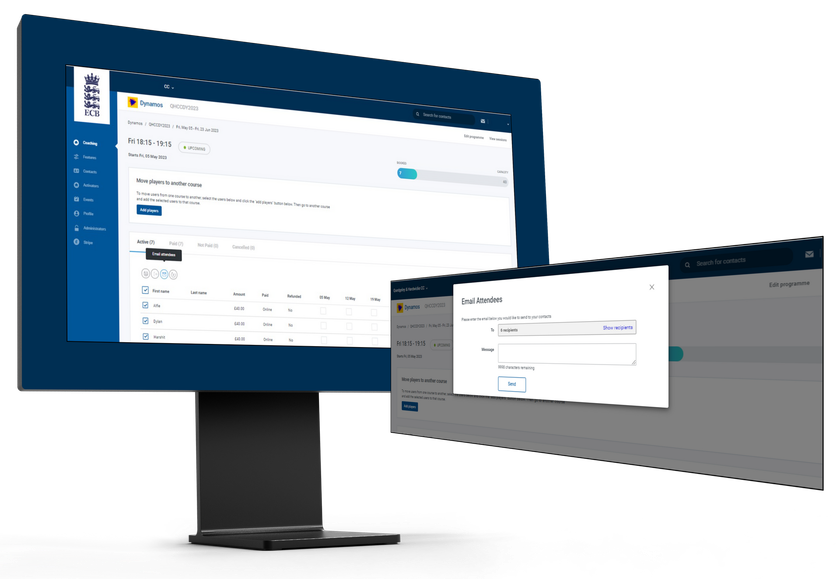
How to access Club Comms to Parent Volunteers’ on Clubspark
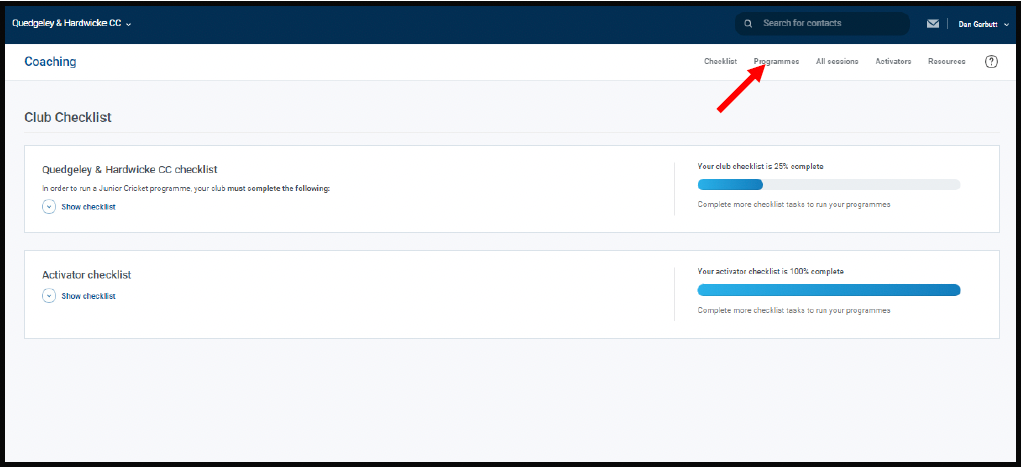
Step 1 :
Select Programmes from ClubSpark Club/Centre coaching menu
Step 2 :
Select the COURSE you’d like to view—All Stars or Dynamos

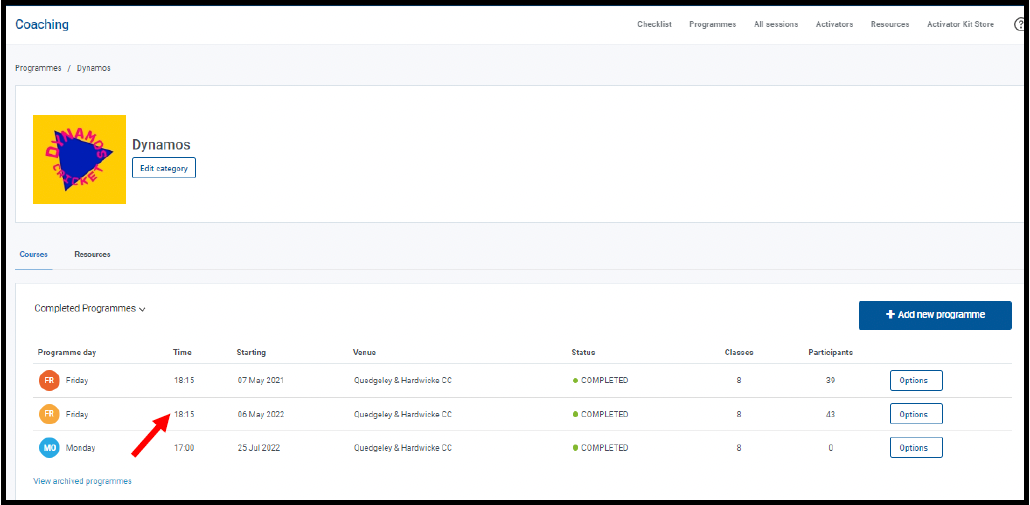
Step 3 :
Select the programme you’d like to view—in this case we’ll be choosing the completed programme from this year
Step 4 :
Select all participants (Green Arrow) and then click on the “export to CSV” option (Red Arrow)
